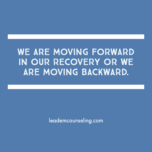 Discovering Your Defects of Character and Insight into What To Do About Them
Discovering Your Defects of Character and Insight into What To Do About Them
We are glad you have returned for Part 4 which outlines the journey that will bring about the discovery of your defects of character and provide insights into what you can do about them.
Returning to The Forgotten Steps
The 6th and 7th Steps [1] are sometimes forgotten, as we mentioned in Part 3, for three key reasons. First, it is assumed that the defects of our character are tied to our periods of active addiction and that when abstinence is achieved the problem behaviors will cease to be a problem. The self-defeating and injurious ways that we behave during our periods of active addiction are certainly exacerbated by the use of a toxic substance or the engagement in addictive behaviors, but they do not produce the behavior. The Latin phrase, in vino veritas, (in wine [there is] truth) does not suggest that the wine creates the truth or causes the behavior that others find hurtful. The wine or any other object of our particular addictive obsession lowers inhibitions or dulls our senses to the point that we act on impulse. Our defects of character, which began as adaptive methods for coping with discomfort during our youth, have developed over time, and became maladaptive as we reached developmental milestones that required that we behave differently. To illustrate, we will take a brief stroll down memory lane.
 When you laid in bed at night frightened of the monster under your bed that was waiting to devour dangling limbs, you developed a coping strategy that “worked” to keep you safe. You learned to lay stiff as a board with your arms pressed hard against your sides to avoid losing your hand to the hungry beast. It worked every night like a lucky charm – because there was no monster. As you grew older and “wiser” you devised similar coping strategies to deal with emotional dangers such as protecting yourself from teasing by not letting others know that it bothered you. That particular strategy was so popular that it was memorialized in a jingle: Sticks and stones may break my bones but words will never hurt me. The author is unknown, so we can never be sure how this strategy was originally tested, but you must wonder: what was he/she thinking? Name calling hurt like heck! But, we still tried to use the children’s nursery rhyme over and over again despite the fact that it did not protect us from injury. Later on, we denounced our interest in the girl that refused to go to the prom with us but it hurt us to the core. Even when our defects of character had become integral components in our denial system, we could not see that denying a problem or an emotional consequence did not really block the pain. Still later, the defects became integral aspects of the delusional system of denial that only appeared to insulate us from the cost of our addiction.
When you laid in bed at night frightened of the monster under your bed that was waiting to devour dangling limbs, you developed a coping strategy that “worked” to keep you safe. You learned to lay stiff as a board with your arms pressed hard against your sides to avoid losing your hand to the hungry beast. It worked every night like a lucky charm – because there was no monster. As you grew older and “wiser” you devised similar coping strategies to deal with emotional dangers such as protecting yourself from teasing by not letting others know that it bothered you. That particular strategy was so popular that it was memorialized in a jingle: Sticks and stones may break my bones but words will never hurt me. The author is unknown, so we can never be sure how this strategy was originally tested, but you must wonder: what was he/she thinking? Name calling hurt like heck! But, we still tried to use the children’s nursery rhyme over and over again despite the fact that it did not protect us from injury. Later on, we denounced our interest in the girl that refused to go to the prom with us but it hurt us to the core. Even when our defects of character had become integral components in our denial system, we could not see that denying a problem or an emotional consequence did not really block the pain. Still later, the defects became integral aspects of the delusional system of denial that only appeared to insulate us from the cost of our addiction.
The second common reason for forgetting the 6th and 7th Steps is related to the peace that follows in the second phase of the surrender process when we share our 4th Step with God and another human being. The relief and gratitude that most of us experience after the 5th Step can easily lull you into a sense of security. The security and common bond that grows between you and other members of the fellowship who have completed this vital step creates a sense of community many of us have never known. If we rest too long, we risk developing the complacent perception that the work is finally over. The work is hardly over. In reality, it has barely begun. Remember the opening line in Twelve Steps and Twelve Traditions that introduces the 6th Step: This is the Step that separates the men from the boys. This line would suggest that the work is not finished with the Fifth Step.
Lastly, the 7th Step reference to asking a power greater than yourself to remove your shortcomings can mislead you into ignoring that the 6th Step is a process step. “We became willing…” suggests that there are lessons learned or tasks undertaken that brought us to the third phase of surrender to ask our Higher Power to remove our shortcomings or defects of character. While it is clear that the power to remove the defect lies outside of us, the responsibility for becoming willing is on us. The 7th Step does not excuse us from completing the 6th step. The serenity that comes with our disclosure is a wonderful gift of sobriety, but we have earned it in the searching and fearless moral inventory we completed in the Fourth Step. It is doubtful that a 5th Step would be possible or valuable without the work completed in your inventory. The 7th Step is similar in that it requires work on our part in the 6th Step. Now that we have made it difficult to forget the 6th and 7th Steps, let us examine some of the benefits of addressing them in a purposeful way.
Nothing Endures But Change
 The ancient Greek philosopher, Heraclitus, is credited with the observation that: nothing endures but change. We are always changing. We are moving forward in our recovery or we are moving backward. While it is not a problem peculiar to people recovering from an addictive illness, it seems particularly hazardous for us to settle into a recovery hover. If you attempt to coast in your recovery you will invariably end up in trouble. Alcoholics Anonymous cautions us against complacency with the reminder that what “ … we really have is a daily reprieve contingent on the maintenance of our spiritual condition” (P 85). If what we have is a daily reprieve we are going to begin moving back toward the symptoms of our active addiction if we are not moving forward toward a greater knowledge of our Higher Power’s will for us and the power and commitment to carry it out in all our affairs. If, on the other hand, we willingly accept that change is inevitable, and we raise the recovery bar to a level that will encourage and cause us to grow, we will not have to slip backwards.
The ancient Greek philosopher, Heraclitus, is credited with the observation that: nothing endures but change. We are always changing. We are moving forward in our recovery or we are moving backward. While it is not a problem peculiar to people recovering from an addictive illness, it seems particularly hazardous for us to settle into a recovery hover. If you attempt to coast in your recovery you will invariably end up in trouble. Alcoholics Anonymous cautions us against complacency with the reminder that what “ … we really have is a daily reprieve contingent on the maintenance of our spiritual condition” (P 85). If what we have is a daily reprieve we are going to begin moving back toward the symptoms of our active addiction if we are not moving forward toward a greater knowledge of our Higher Power’s will for us and the power and commitment to carry it out in all our affairs. If, on the other hand, we willingly accept that change is inevitable, and we raise the recovery bar to a level that will encourage and cause us to grow, we will not have to slip backwards.
Fortunately, or unfortunately, depending on your perspective, your progress through the 12 Steps will be governed by the same universal law of change that Heraclitus observed, and there is no record of him having been in a 12 Step program. If you stall at the First Step you may not be restored to the sanity referred to in the 2nd Step. A searching and fearless moral inventory that is not shared, from your 4th Step, will become an incredible burden because the 5th Step promotes cleansing; sort of a spiritual cleansing if you will. The Promises in Alcoholics Anonymous, which many 12 Step fellowships refer to as the benefits of working the program, do not appear until after the introduction of the 9th Step. The Promises are reprinted below for your reference:
If we are painstaking about this phase of our development, we will be amazed before we are half way through. We are going to know a new freedom and a new happiness. We will not regret the past nor wish to shut the door on it. We will comprehend the word serenity and we will know peace. No matter how far down the scale we have gone, we will see how our experience can benefit others. That feeling of uselessness and self-pity will disappear. We will lose interest in selfish things and gain interest in our fellows. Self-seeking will slip away. Our whole attitude and outlook upon life will change. Fear of people and of economic insecurity will leave us. We will intuitively know how to handle situations that used to baffle us. We will suddenly realize that God is doing for us what we could not do for ourselves.
(Alcoholics Anonymous, 1953, pp. 83-84) [2]
 If you stop your recovery work before Step 9, you are likely to miss out on more than the Promises. The process of making amends found in the 8th and 9th Steps can bring healing to deeply troubled relationships. And, even if all the relationships you have harmed cannot be repaired, you will never have to look over your shoulder again if you have attempted a thorough amends. The maintenance of Steps Ten through Twelve continues the message of change, change, and more change with a framework for continuing the work that we began in the previous nine Steps. In fact, if you have read the entire program you already know that the last three steps suggest you can never graduate from the recovery process. What an ironic twist for those of us who have a history of quitting whatever becomes difficult that we find ourselves advancing in our recovery that has no endpoint. There is no graduation. There may be cake; we have lots of cake, but no diploma for as you’ve heard we have a daily reprieve contingent on the maintenance of our spiritual condition. We never get to say we have finally seen something through to the end.
If you stop your recovery work before Step 9, you are likely to miss out on more than the Promises. The process of making amends found in the 8th and 9th Steps can bring healing to deeply troubled relationships. And, even if all the relationships you have harmed cannot be repaired, you will never have to look over your shoulder again if you have attempted a thorough amends. The maintenance of Steps Ten through Twelve continues the message of change, change, and more change with a framework for continuing the work that we began in the previous nine Steps. In fact, if you have read the entire program you already know that the last three steps suggest you can never graduate from the recovery process. What an ironic twist for those of us who have a history of quitting whatever becomes difficult that we find ourselves advancing in our recovery that has no endpoint. There is no graduation. There may be cake; we have lots of cake, but no diploma for as you’ve heard we have a daily reprieve contingent on the maintenance of our spiritual condition. We never get to say we have finally seen something through to the end.
So what, you ask, does all this have to do with competing a 6th Step? Just this – there is no lasting change that occurs without the surrender found in the 7th Step, and you cannot get to the 7thStep without completing the 6thStep. Let’s take a moment to review the five-part surrender process.
The Five-Part Surrender Process
 The 3rd Step, the first phase in the surrender process, signaled the beginning of the end of doing the same things over and over again expecting that the results were going to be different. The 5th Step promotes the surrender of your secrets and a measurable and concerted effort to rely on another person for support and as such becomes the second phase of the surrender process. Our tendency to continue to address challenges with the ineffective methods of our past is a process driven by our defects of character. The 7th Step marks the third surrender phase because it reflects the point at which you begin exchanging your war-torn coping strategies (defects of character) for new ways of dealing with your emotions, allowing you to build a healthy model for interacting with other people.
The 3rd Step, the first phase in the surrender process, signaled the beginning of the end of doing the same things over and over again expecting that the results were going to be different. The 5th Step promotes the surrender of your secrets and a measurable and concerted effort to rely on another person for support and as such becomes the second phase of the surrender process. Our tendency to continue to address challenges with the ineffective methods of our past is a process driven by our defects of character. The 7th Step marks the third surrender phase because it reflects the point at which you begin exchanging your war-torn coping strategies (defects of character) for new ways of dealing with your emotions, allowing you to build a healthy model for interacting with other people.
The fourth phase comes in the 9th Step when you give up the shadows and face those you have wronged, with an understanding that there is no going back to pretending that things are alright when they are not. The fifth and last phase in the surrender process represents the culmination of all your work and decision to apply the kit of spiritual principles you have acquired in every area of your life. What an order! Do not be afraid, we have not gotten there yet. Now aren’t you glad you are only on the 6th Step?
Please join us for the next article in the series which highlights the wisdom found on the old recovery adage that warns us that: “the person I was will drink again”.
We hope you enjoy this introduction to our work. If you are interested in more, please follow the links listed below.
Related Articles
About the Authors

Both John and Shawn Leadem are Licensed Clinical Social Workers in private practice in Toms River, New Jersey.
John has recently celebrated his 48th year in recovery and believes that “service to others is the cornerstone of spiritual maturity.” His professional service to addicted individuals and their families has included the development and direction of addiction treatment services in a full array of modalities from half-way houses to large residential treatment facilities over the past 45 years.
Shawn’s lifelong exposure to the recovery culture and his personal recovery experience has left him with a deep personal empathy for the social and emotional suffering endured by others and a strong faith in a person’s ability to change. He has received his certification as a Sexual Addiction Therapist and as a Multiple Addictions Therapist by the International Institute for Trauma & Addiction Professionals.
Together, John and Shawn have co-authored and brought their unique treatment model of relapse prevention, An Ounce of Prevention: A Course in Relapse Prevention, to residential treatment centers across the United States, they have trained therapists at numerous national and international conferences, and most recently have trained many EAP programs associated with many State Unions.
Footnotes
[1] Alcoholics Anonymous. (2001). Alcoholics Anonymous, 4th Edition. New York: A.A. World Services.
The Steps, as they appear on pages 59 and 60 of Alcoholics Anonymous.
- We admitted that we were powerless over alcohol – that our lives had become unmanageable.
- Came to believe that a Power greater than ourselves could restore us to sanity.
- Made a decision to turn our will and our lives over to the care of God as we understood Him.
- Made a searching and fearless moral inventory of ourselves.
- Admitted to God, to ourselves, and to another human being the exact nature of our wrongs.
- Were entirely ready to have God remove all these defects of character.
- Humbly asked Him to remove our shortcomings.
- Made a list of all persons we had harmed, and became willing to make amends to them all.
- Made direct amends to such people wherever possible, except when to do so would injure them or others.
- Continued to take personal inventory and when we were wrong promptly admitted it.
- Sought through prayer and meditation to improve our conscious contact with God as we understood Him, praying only for knowledge of His will for us and the power to carry that out.
- Having had a spiritual awakening as the result of these steps, we tried to carry this message to alcoholics, and to practice these principles in all our affairs.
[2] Alcoholics Anonymous. (1953). Twelve Steps and Twelve Traditions. New York: A.A. World Services.
Copyright, John Leadem & Shawn Leadem, 2019
You are free to copy this article for future reference, to post it on other web sites and to share it with family or friends. If you would like to have permission to include it in a publication of your own you can request written permission by contacting the authors at www.leademcounseling.com.
[apss-share networks="facebook, twitter, google-plus, pinterest, linkedin" counter="0" total_counter="0" http_count="1"]







No Comments Yet | Post Comment
You can be the first to comment!
Leave a comment